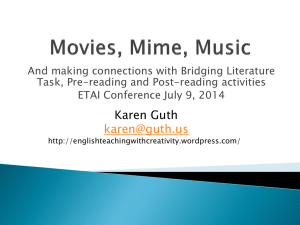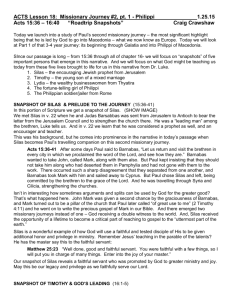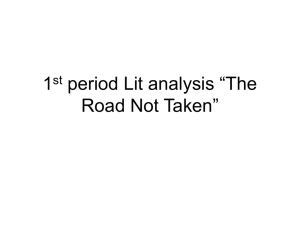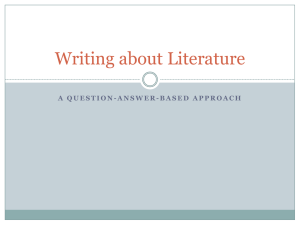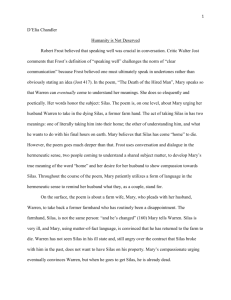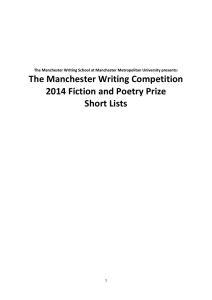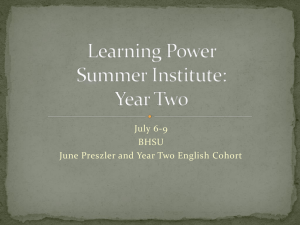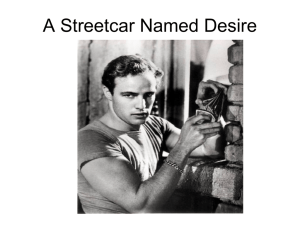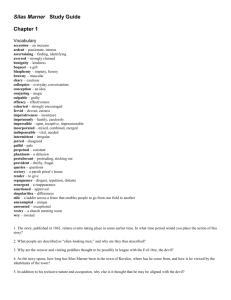William Carlos Williams and Robert Frost - CHSVocab10-3
advertisement
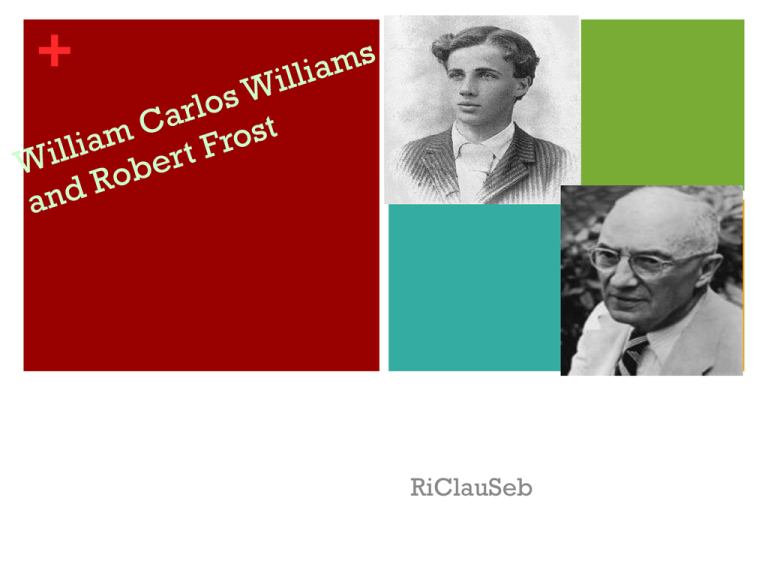
+ RiClauSeb + The Red Wheelbarrow By William Carlos Williams + William Carlos Williams Born: 1883 in Rutherford, New Jersey. Began writing poetry: While a student at Horace Mann High School, at which time he made the decision to become both a writer and a doctor. - Continued on next slide + Continued Returned to: Rutherford where he sustained his medical practice throughout his life. Published in: Small magazines and embarked on a prolific career as a poet, novelist, essayist, and playwright. Experimented with: New techniques of meter and lineation; He sought to: Invent an entirely fresh and singularly American poetry style, whose subject matter was centered on the everyday circumstances of life and the lives of common people. - Continued on next slide + Continued His major works include: Kora in Hell (1920), Spring and All (1923), Pictures from Brueghel and Other Poems (1962), (five volumes) Paterson (1963, 1992), and Imaginations (1970). + QUIZ BREAK What style does William Carlos Williams write in? Imagism – the capturing of an instant of an everyday moment in poetry. + The Red Wheelbarrow so much depends upon a red wheel barrow glazed with rain water beside the white chickens. + Analysis Our speaker is invisible. There's something about the way in which our speaker reflects on an object as ordinary as a wheelbarrow that makes us think he has learned a thing or two about life. It feels like the wheelbarrow is being personified because it’s given so much importance. All the speaker has to do to paint the image for us is to tell that it is a "red wheelbarrow”. Alliteration in the first line, due to all of those "s" sounds. Assonance of that long "a" sound in "glazed" and "rain”. + QUIZ BREAK Why does the wheelbarrow seem personified? It seems personified because it says so much depends on the red wheelbarrow, as though it were a breadwinner or a god. What literary devices are being used in “The Red Wheelbarrow”? Alliteration and assonance + Death of a Hired Man By Robert Frost + Robert Frost Robert Frost was born on March 26, 1874 in San Francisco, California. When Frost was two years old, his mother fled to Lawrence, Massachusetts, to get away from her husband, who was a drunkard. She stayed there until her second baby was born, Jeannie, Robert's sister. Then they went back to San Francisco. By the time he was 11, Robert Frost had crossed the U.S. three times. Robert never had any jobs, except being a poet and he published many poems in his lifetime. Some of them are: The Road not Taken, The Raft of Flowers, The Pasture, and others. Robert also won four Pultizer awards and read The Gift Outright at the inauguration of John. F. Kennedy. He died on January 29, 1963 of a heart attack. + Summary A farm wife, Mary, pleads with her husband, Warren, to take back a former farmhand who has always disappointed him. The farmhand, Silas, is very ill, and Mary is convinced that he has returned to the farm to die. Warren has not seen Silas in sick, and is still angry over the contract that Silas broke when them in the past, does not want to have Silas on his property. Mary’s compassionate urging eventually convinces him, but when Warren goes to get Silas, he is already dead. + QUIZ BREAK What is the poem about? A man and a woman, farm owners, who are faced with a dying, temporary employee coming to their house to die. + Analysis This poem contains many of the stereotypical characteristics of Frost’s poetry, particularly the rural environment, the everyday struggle of the farm couple over their relationship to the farmhand, and the colloquial dialogue. Frost outlines the traditions of duty and hard work that he explores in many of his other poems. Silas returns to the farm so that he can fulfill his broken contract to Warren and die honorably, having fulfilled his duty to the family and to the community. + Continued Silas’ return to the farm also signals the importance of the work that he performed on the farm as a way to give his life meaning and satisfaction. Silas does not have any children or close family to provide a sense of fulfillment in his last hours; only the sense of duty and the satisfaction of hard work can provide him with comfort. + Continued The poem also creates a clear dichotomy between Mary and Warren, between Mary’s compassionate willingness to help Silas and Warren’s feelings of resentment over the broken contract. Mary follows the model of Christian forgiveness that expects her to help Silas because he needs it, not because he deserves it. Warren, on the other hand, does not believe that they owe anything to Silas and feels that they are not bound to help him. + QUIZ BREAK What distinguishes Frost’s poetry from other poets’? The rural setting, the everyday struggle of the farm couple over their relationship to the farmhand, and the colloquial dialogue. Why did Silas go to that farm, specifically, even though his rich brother lived nearby? So that he can fulfill his broken contract to Warren and die honorably, having fulfilled his duty to the family and to the community. Why does Warren feel he owes nothing to Silas? Because Silas was never a good or especially special farmhand. + Literary Terms + Imagism A twentieth century movement in European and American poetry that advocated the creation of hard clear images, concisely expressed in everyday Speech. A great example of this is “The Great Figure” by William Carlos Williams “Among the rain/ and lights/ I saw the figure 5/ in gold/ on a red/ fire truck/ moving tense/ unheeded /to gong clangs /siren howls /and wheels rumbling /through the dark city” + Objectivity Suggests that the writer’s purpose is to report facts, avoiding personal judgments and feelings. “Design” by Robert Frost “I found a dimpled spider, fat and white, /On a white heal-all, holding up a moth/…Then steered the white moth thither in the night? + Subjectivity In terms of writing, suggests that the writer’s primary purpose is to express personal feelings, and ideas “This Is Just To Say” by William Carlos Williams “I have eaten/the plums /that were in/ the icebox/ and which/ you were probably/ saving /for breakfast/ Forgive me/ they were delicious/ so sweet/ and so cold” + Plot The series of related events in a story or play, sometimes called the story line. “This is Just to Say” by William Carlos Williams “I have eaten/the plums /that were in/ the icebox/ and which/ you were probably/ saving /for breakfast/ Forgive me/ they were delicious/ so sweet/ and so cold” + Theme The light about human life that is revealed in literary work “Design” by Robert Frost “I found a dimpled spider, fat and white,/ On a white heal-all, holding up a moth/ Like a white piece of rigid satin cloth/[…] A snowdrop spider, a flower like a froth/[…]What but design of darkness to appall?/ If design govern in a thing so small. + Flashback A scene that interrupts the normal chronological sequence of events in a story to depict something that happened at an earlier time “The Great Figure” by William Carlos Williams “Among the rain/ and lights/ I saw the figure 5/ in gold/ on a red/ fire truck/ moving tense/ unheeded /to gong clangs /siren howls /and wheels rumbling /through the dark city” + Foreshadowing The use of hints and clues to suggest what will happen later in a plot “Nothing gold can stay” by Robert Frost “Nature’s first green is gold,/[…] Then leaf subsides to leaf./ So eden sank to grief,/ So dawn goes down today. /Nothing gold can stay” + Motivation The reasons for a character’s behavior “This Is Just To Say” by William Carlos Williams “I have eaten/the plums /that were in/ the icebox/ and which/ you were probably/ saving /for breakfast/ Forgive me/ they were delicious/ so sweet/ and so cold” + Internal Rhyme Rhyme that occurs within a line of poetry or within consecutive lines In the poem Nothing Gold Can Stay by Robert Frost there are these examples: “So dawn goes down to day” “Then leaf subsides to leaf” + Sound Effects The use of sounds to create specific literary effects “The Great Figure” by William Carlos Williams “On a Red /fire truck/ moving tense/ unheeded/ to gong clangs/ siren howls/ and wheels rumbling /through the dark city”


